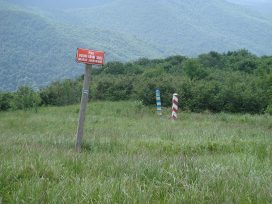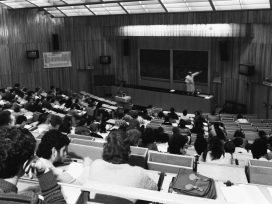No joke: Ukraine’s grassroots public-service broadcaster
Ukrainian media are forced to choose between ‘patriotic’ journalism and impartiality. Angelina Kariakina explains why having a public-service broadcaster can be a game-changer in Ukraine’s fight against Russian military aggression and ongoing corruption.
In January 2015 I decided to leave my job at a major European broadcaster and join an independent grassroots initiative called Hromadske (‘public’). Hromadske, an internet TV channel founded by a group of Ukraine’s brightest journalists, had already gained massive public support and popularity. This tiny do-it-yourself station had provided 24/7 coverage of the 2013 protests against Viktor Yanukovych and his corrupt regime, which had decided to ally with Russia instead of signing the much anticipated association agreement with the European Union. Live streams via phones instead of TV cameras, Skype calls instead of OB trucks, an all-in-one studio, volunteer producers, editors and presenters – this was how Hromadske broadcast what is now known as the Revolution of Dignity. When the Russian military intervened in Donbas and the conflict escalated, I felt that the Ukrainian audience needed more in-depth reporting. I was frustrated with the news coverage I had been delivering, so I joined this crazy team believing I could make more of a contribution. There was no better place to do so. But no other place, either.
Ukraine’s media market has been owned by the country’s oligarchs for decades. They may switch roles in government, metamorphose into ‘philanthropists’ or even ‘peacekeepers’, but they always make sure that their media – which basically covers all the major TV channels and the vast majority of newspapers – serve their political agenda and protect their interests. There has never been an independent player to set the rules, either on the media market or in the journalistic profession. Importantly, though, there have always been individual initiatives. Hromadske was one of these. The goal it set itself was ambitious: to create Ukraine’s first ever public-service broadcaster.
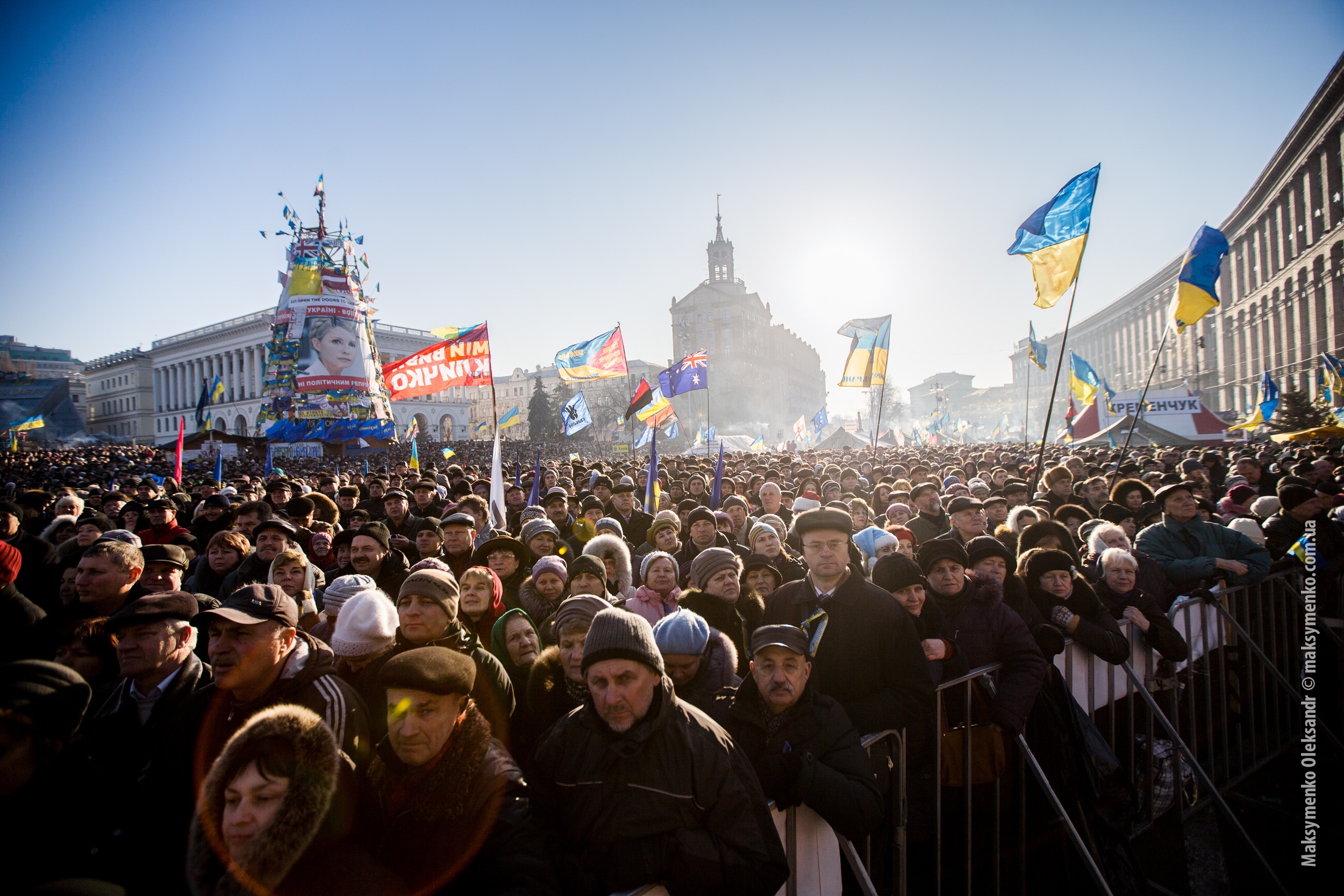
Kyiv’s Maidan on 29 December 2013. Photo Sasha Maksymenko. Source: Flickr
Hromadske’s first broadcast in November 2013 coincided with the beginning of the revolution. Ukrainians were struggling to achieve structural changes, new rules and new roles, as well as for unity and security. To achieve that, it would be necessary to ensure the free flow of information and free competition in ideas. At the time, Ukraine’s media market was unable to provide this. Meanwhile, the unfolding conflict in eastern Ukraine and ongoing corruption revealed that we didn’t really understand the country we were living in. The new leadership had no clear idea of precisely what country we were now building. We needed to talk to each other more than ever. Creating a public broadcaster and preserving its integrity seemed like the natural decision after the revolution.
The day came when steps were taken to finally kick off reforms. A huge, formerly state-owned broadcaster with thousands of employees, many of whom had been working there for decades and had never heard of Twitter or Facebook, had to be recreated from scratch. Hromadske didn’t have time to wait. We didn’t need a complicated infrastructure. By the time we started sharing content and talent with the newly created public-service broadcaster, we were already operating. Our humble coverage in three languages – Ukrainian,1 Russian2 and English3 – could more or less fill a 24/7 channel. In 2017 we set a precedent, by becoming Ukraine’s first NGO to get a TV broadcasting licence. But with all these steps that we were taking, our difficulties were growing.
Apart from the money that we still had to fundraise each time one or other project ended, and apart from a massive shortage of skills on the market and the challenges of building up an institution with transparent policies, we suddenly faced something we weren’t ready for: our audience wasn’t looking for impartiality, as we thought it would. Frustrated with the losses on the frontline, the lack of justice and the slow pace of reform, our audience had started looking for enemies. And there were those who delivered what they wanted: the oligarch-owned media, bloggers, trolls and bots. Pointing fingers at those who weren’t ‘patriotic’, compiling lists of ‘traitors’ and ‘collaborators’, calling for boycotts – this has become the new reality in Ukraine.
The notion of ‘patriotism’ in this context needs explaining. It basically means that you don’t criticize the government, ‘because it’s at war with Russia’; if you do, you play into the hands of the Kremlin. You need to help your government along – if necessary by keeping your mouth shut about its mistakes and even crimes.
Our journalists would usually end up on those ‘lists of traitors’ and receive threats – just because we believed that reporting from the uncontrolled territories of Donbas and occupied Crimea were an essential part of our coverage. The ruthless murder of our colleague and friend, the well-known journalist Pavel Sheremet, who was blown up in his car in the centre of Kyiv last summer, sowed fear among us. This fear will persist until the murderers are found.
You might say that this is nothing extraordinary for the rest of the world. It is 2017, after all: the ‘alternative facts’ of the Trump presidency and the Brexit campaign didn’t do much to unite societies either. Why do you need journalists if your own social media feed is perfectly designed to keep you informed about what you believe in, while keeping out the views you would rather not hear about? Well, the answer is that life doesn’t follow social-media algorithms. You can’t ‘unfollow’ half of your country – or, say, your neighbour. One day you will have to face him or her and start a dialogue. And we journalists will have to be there to make it happen.
We were recently sitting in a planning session discussing the new TV season. ‘Let’s do a programme on media’, suggested one of my colleagues, ‘and call it something provocative… BBC standards!’ We all burst out laughing: In the dominant paradigm of ‘patriotic’ journalism, ‘BBC standards’ is a meme, a provocation, a joke. For us, though, it is real. We might not be Ukraine’s BBC. But we are working on it.
Published 6 December 2017
Original in English
First published by IWM Post 120 (Fall/Winter 2017)
© Angelina Kariakina / IWM Post / Eurozine
PDF/PRINTIn collaboration with
In focal points
Newsletter
Subscribe to know what’s worth thinking about.
Related Articles
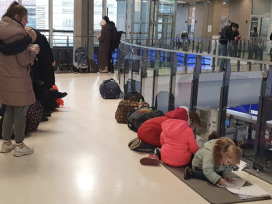
'It’s important to be open'
A Knowledgeable Youth podcast
Remaining in a new country or returning home? The Knowledgeable Youth podcast delves into the complex decision-making refugees face when migrating, together with researcher Olena Yermakova.
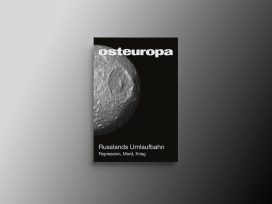
Russia’s orbit
Osteuropa 4/2024
Repression, murder, war: on the logic driving the Putin regime toward ever-greater excesses of violence. Featuring Yuri Andrukhovych on the Russian colonial empire – the only ever to have tried to reconquer a former possession. Also: articles on Navalny, and on what next for Georgia?




